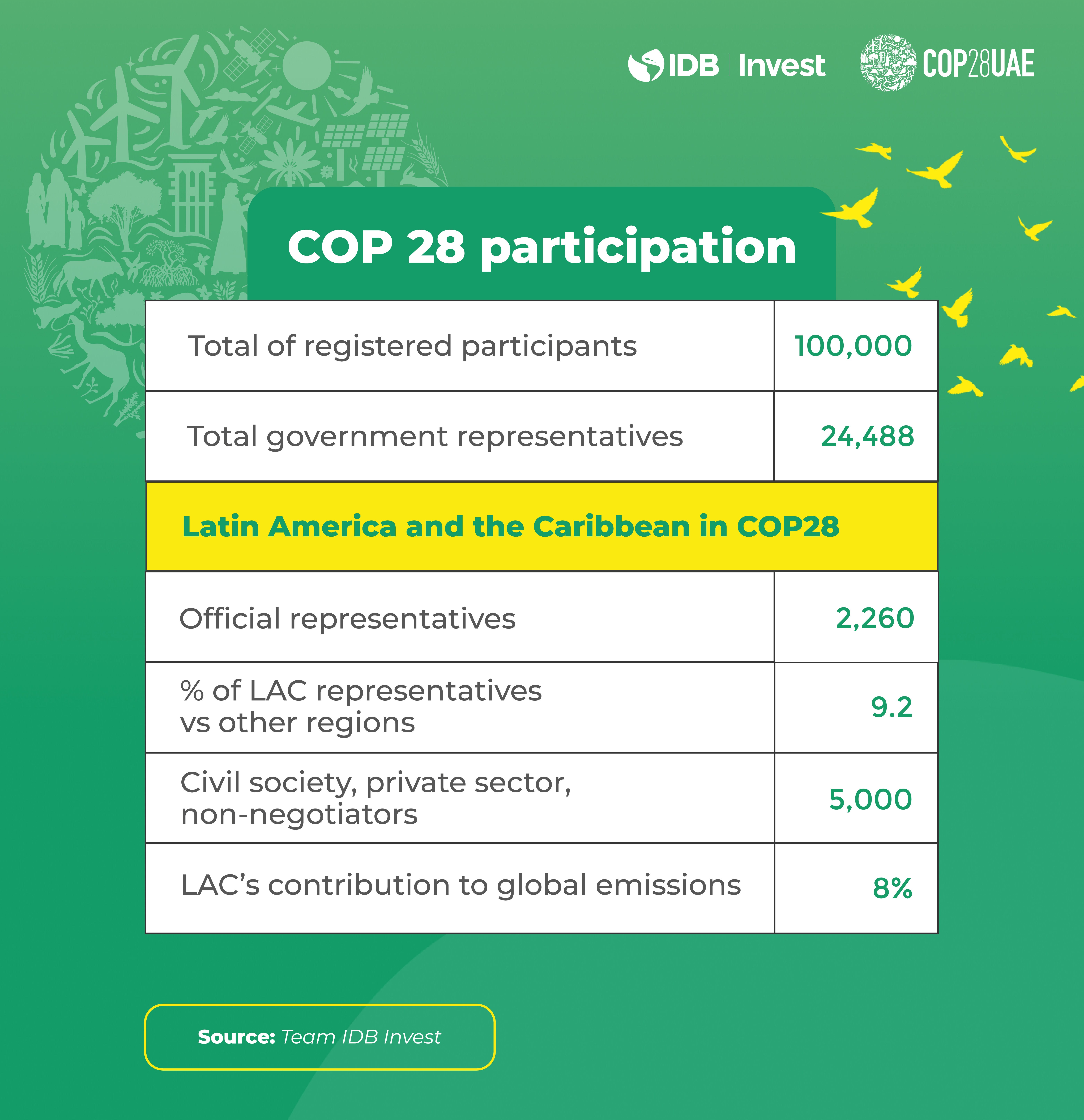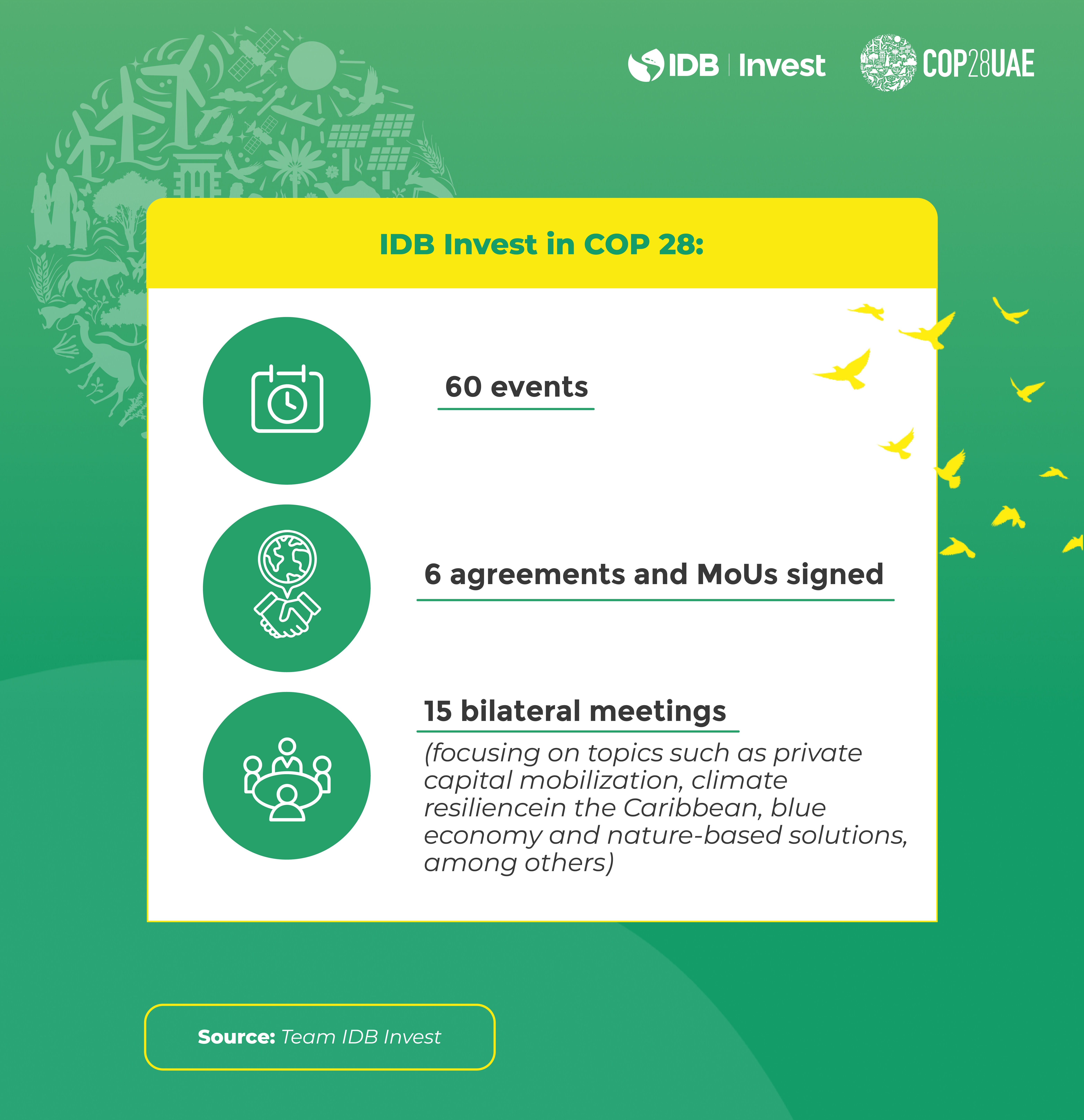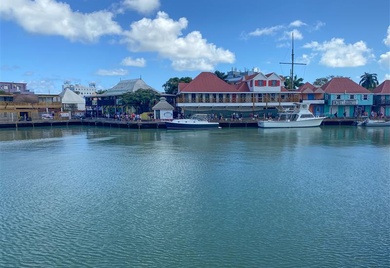Want Global Solutions on Climate? Look at Latin America and the Caribbean

What did COP28 mean for Latin America and Caribbean? The answer may not be in the summit’s final declaration, but in the corridors of the Dubai EXPO where the Region was recognized as Pioneering Global Climate Solutions, with the Bridgetown Initiative and private deals promoting innovative models for land restoration as just two of many examples.
Ours is recognized as a global solutions region for our unique capabilities to address climate change challenges, the access to vast reserves of key minerals for the energy transition like lithium and copper, rich biodiversity, potential for clean energy development, and the ability to lead in adaptation and nature-based solutions.

The idea that the region can serve as a solution generator was floating across different meeting rooms and pavilions, such as Caricom and Caribbean Development Bank, IICA, CAF, as well as country's pavilions such as Barbados, Colombia and Peru.
An idea very much in line with the landmark decision, championed by Razan Khalifa Al Mubarak, the UN Climate Change High-Level Champion for COP28, that pushed for the inclusion of biodiversity and natural environments in climate action discussions.
The fact that the Region houses one of the largest forests in the world has also become a cornerstone for the IDB Group climate action through its Amazonia Forever - a holistic umbrella program that aims to scale up financing, share strategic knowledge, and enhance regional coordination to accelerate the sustainable development of the Amazon region, working with the public and private sectors.
Innovative ideas for climate action: financial structuring and climate tech
Being one of the most vulnerable regions to climate change in the world, the Caribbean has recognized that waiting for action is not a luxury they can enjoy, past solutions may not be fit for purpose and only new and innovative ideas will be up to the challenge.
An example of this ambitious mindset is seen at the Bridgetown Initiative, a groundbreaking approach to substantially tweaking the global financial architecture and make much more money available, allow more flexibility in how countries could spend it, and have the international financial institutions act as guarantors for larger, more substantial private sector funding.
You may also find interesting
- Maximiliano Bello: "If we did not extract the fish from the sea, what could be its value?"
- Facilitating Successful Climate Action for Latin American and Caribbean Small and Midsized Businesses
While this idea is taking root in many G20 conversations and current International Financial Institutions (IFIs) and Multilateral Development Banks (MDBs) reforms, the IDB Group has put some pioneering ideas into making the Bridgetown Initiative a reality.
For example, financial structures that reduce the level of debt through debt-for-nature and debt-for-climate swaps to promote climate action, as seen in Ecuador, the Bahamas, and Barbados. These swaps either extend or change the timing of the debt repayment by incorporating Climate Resiliency Debt Clauses.
IDB Invest has also introduced financial resilience clauses to protect production flows in agribusiness against climatic events and to safeguard infrastructure projects, such as ports in the Caribbean. Measures to climate-proof private investments include offering loan repayment facilities, either by granting longer tenures or by extending those initially planned, if necessary.

But innovation is also growing in Latin America at a more granular level. IDB Group, via its innovation laboratory, IDB Lab, is a key driver in the development of innovation ecosystem across the region. This encompasses resource mobilization, the establishment of collaborative platforms and investment frameworks, and the initiation of projects tailored to the region's distinct challenges and opportunities.
The Green Entrepreneurial Engine, which represents a financial commitment of $46 million from 26 partners, aimed at fostering climate and nature-based innovations, is one of the most recent examples.
COP28 also served as a platform for a preview of an ongoing study of climate tech solutions, led by IDB Lab and IDB Invest, that screened and identified over a thousand Climate Tech solutions, from nature-based to renewable energy generation to AgFood tech, carbon monitoring and sustainable materials. These start-ups can be also the seed for seizing the $2.7 trillion opportunity that net zero could bring to the region, according to a recently released IDB study
Private sector led climate action
Another remarkable aspect of this COP was the role of the private sector, both in the number of participants and in the commitments and initiatives unleashed. The Business & Philanthropy Climate Forum was COP28’s multistakeholder engagement platform for the private sector, which brought more than 1,300 global business leaders and philanthropists together with MDBs and political leaders from emerging economies.
IDB Invest took an active role as a delivery partner, together with institutions such as IFC, OECD, WEF, ADB, AFC, Bill & Melinda Gates Foundation, WBCSD, BEEAH Group and XPRIZE.The Forum featured a  and commitments totaling $5bn in collective funding for initiatives related to renewable energy and green economy programs, commitments on nature, a methane abatement and initiatives to decarbonize health supply chains.
Other examples of the private sector focus at COP28 are The UN Global Compact Think Lab on Biodiversity and Nature - an initiative that will assist companies in implementing nature strategies. The release of the Race to Zero 2023 Progress Report, showcasing the progress of its 143 members and Global Capacity Building Coalition, supported by Bloomberg Philanthropies, MDBs and Glasgow Financial Alliance for Net Zero (GFANZ), which aims to significantly increase the availability and effectiveness of climate finance technical assistance programs for financial institutions in emerging markets and developing economies.
Post-COP28, Latin America and the Caribbean are poised to utilize natural resources and climate innovations. Yet, facing financial, tech, and policy challenges, a holistic approach and partnerships are crucial. IDB Invest pioneers a business model, mobilizing private capital for LAC climate initiatives.
This proactive strategy reshapes the global climate financial landscape, demonstrating how financial institutions, working together with the private sector, can be dynamic catalysts in addressing climate change, crucial for turning challenges into sustainable opportunities.
Latest posts
- Nine Transportation Challenges Technology Could Solve
- Trending: Markets' Growing Appetite for Sustainability
LIKE WHAT YOU JUST READ?
Subscribe to our mailing list to stay informed on the latest IDB Invest news, blog posts, upcoming events, and to learn more about specific areas of interest.
Subscribe



